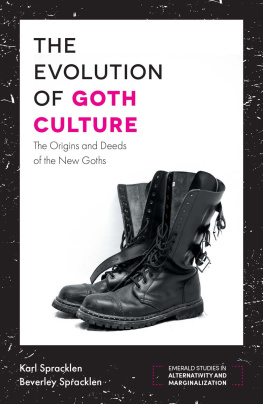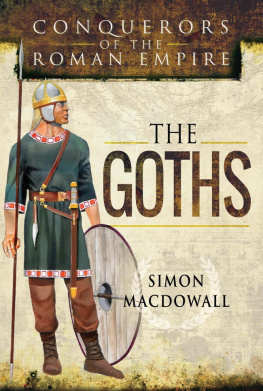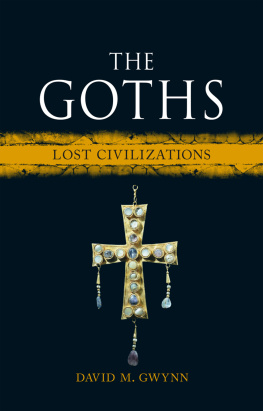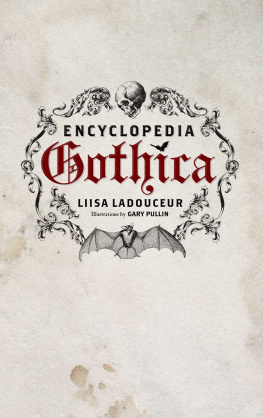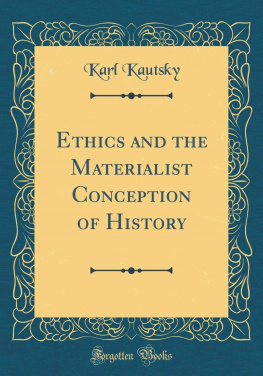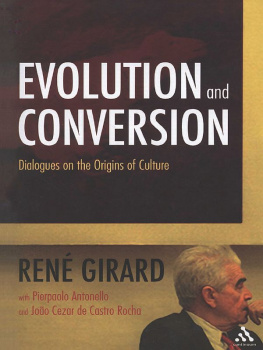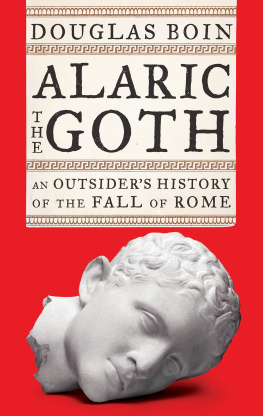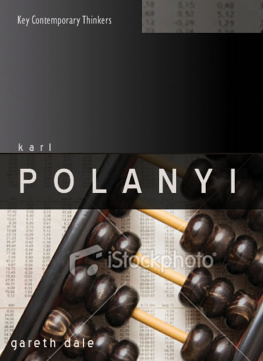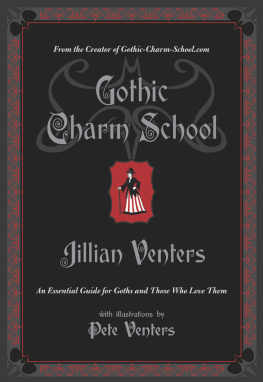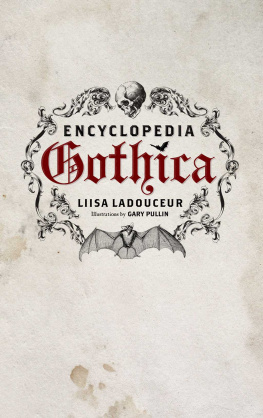Karl Spracklen - The Evolution of Goth Culture: The Origins and Deeds of the New Goths
Here you can read online Karl Spracklen - The Evolution of Goth Culture: The Origins and Deeds of the New Goths full text of the book (entire story) in english for free. Download pdf and epub, get meaning, cover and reviews about this ebook. year: 2018, publisher: Emerald Publishing, genre: Art. Description of the work, (preface) as well as reviews are available. Best literature library LitArk.com created for fans of good reading and offers a wide selection of genres:
Romance novel
Science fiction
Adventure
Detective
Science
History
Home and family
Prose
Art
Politics
Computer
Non-fiction
Religion
Business
Children
Humor
Choose a favorite category and find really read worthwhile books. Enjoy immersion in the world of imagination, feel the emotions of the characters or learn something new for yourself, make an fascinating discovery.
- Book:The Evolution of Goth Culture: The Origins and Deeds of the New Goths
- Author:
- Publisher:Emerald Publishing
- Genre:
- Year:2018
- Rating:5 / 5
- Favourites:Add to favourites
- Your mark:
- 100
- 1
- 2
- 3
- 4
- 5
The Evolution of Goth Culture: The Origins and Deeds of the New Goths: summary, description and annotation
We offer to read an annotation, description, summary or preface (depends on what the author of the book "The Evolution of Goth Culture: The Origins and Deeds of the New Goths" wrote himself). If you haven't found the necessary information about the book — write in the comments, we will try to find it.
Karl Spracklen: author's other books
Who wrote The Evolution of Goth Culture: The Origins and Deeds of the New Goths? Find out the surname, the name of the author of the book and a list of all author's works by series.
The Evolution of Goth Culture: The Origins and Deeds of the New Goths — read online for free the complete book (whole text) full work
Below is the text of the book, divided by pages. System saving the place of the last page read, allows you to conveniently read the book "The Evolution of Goth Culture: The Origins and Deeds of the New Goths" online for free, without having to search again every time where you left off. Put a bookmark, and you can go to the page where you finished reading at any time.
Font size:
Interval:
Bookmark:
THE EVOLUTION OF GOTH CULTURE
EMERALD STUDIES IN ALTERNATIVITY AND MARGINALIZATION
Series Editors: Samantha Holland, Leeds Beckett University, UK and Karl Spracklen, Leeds Beckett University, UK
There is growing interest in work on transgression, liminality and sub-cultural capital within cultural studies, sociology and the social sciences more broadly. However, there is a lack of understanding of the problem of alternativity: what it means to be alternative in culture and society in modernity. What alternative looks like is often left unexplored. The alternative is either assumed un-problematically, or stands in for some other form of social and cultural exclusion.
Alternativity delineates those spaces, scenes, sub-cultures, objects and practices in modern society that are actively designed to be counter or resistive to mainstream popular culture. Alternativity is associated with marginalisation, both actively pursued by individuals, and imposed on individuals and sub-cultures. Alternativity was originally represented and constructed through acts of transgression and through shared sub-cultural capital. In contemporary society, alternative music scenes such as heavy metal, goth and punk have spread around the world; and alternative fashions and embodiment practices are now adopted by footballers and fashion models. The nature of alternativity as a communicative lifeworld is now questioned in an age of globalisation and hyper-commodification.
This book series provides a stimulus to new research and new theorising on alternativity and marginalisation. It provides a focus for scholars interested in sociological and cultural research that expands our understanding of the ontological status of spaces, scenes, sub-cultures, objects and practices defined as alternative, liminal or transgressive. In turn, the book series enables scholars to theorise about the status of the alternative in contemporary culture and society.
Titles in this series
Amanda DiGioia, Childbirth and Parenting in Horror Texts: The Marginalized and the Monstrous
Samantha Holland and Karl Spracklen (Eds.), Subcultures, Bodies and Spaces: Essays on Alternativity and Marginalization
Stephen Brown and Marie-Ccile Cervellon, Revolutionary Nostalgia: Neo-Burlesque, Retromania and Social Change
KARL SPRACKLEN
Leeds Beckett University, UK
and
BEVERLEY SPRACKLEN
Independent Scholar, UK

United Kingdom North America Japan India Malaysia China
Emerald Publishing Limited
Howard House, Wagon Lane, Bingley BD16 1WA, UK
First edition 2018
Copyright 2018 Emerald Publishing Limited
Reprints and permissions service
Contact:
No part of this book may be reproduced, stored in a retrieval system, transmitted in any form or by any means electronic, mechanical, photocopying, recording or otherwise without either the prior written permission of the publisher or a licence permitting restricted copying issued in the UK by The Copyright Licensing Agency and in the USA by The Copyright Clearance Center. Any opinions expressed in the chapters are those of the authors. Whilst Emerald makes every effort to ensure the quality and accuracy of its content, Emerald makes no representation implied or otherwise, as to the chapters suitability and application and disclaims any warranties, express or implied, to their use.
British Library Cataloguing in Publication Data
A catalogue record for this book is available from the British Library
ISBN: 978-1-78714-677-8 (Print)
ISBN: 978-1-78714-676-1 (Online)
ISBN: 978-1-78743-930-6 (Epub)

Chapter 1
What is goth? This book is an attempt to answer that question by exploring the history of the evolution of goth culture, that is, the origins and deeds of the goths. Goth, like culture or sub-culture or alternativity, is a problematic concept, having multiple meanings and uses. We want to avoid any attempt to provide a definitive story to what goth is, or where it started, because these are stories that are strongly contested by people who identity as goths. People who write popular narratives about the origins and deeds of the goths, what goth culture is or goth style is, may have some insider understanding, or they may be outsiders reproducing stereotypes about what the Internet thinks goths do and what they look like. We want to explore the construction of the collective memory of goth. That is, we want to explore what goths think are the important moments in their evolution and important aspects of their culture, and how that is reflected in wider accounts of that history and culture. Having said all that, for those unfamiliar with the history and culture of goth, a short explanation follows. First, gothic or goth emerged as a sub-genre label for a number of bands in the post-punk movement in the United Kingdom at the beginning of the 1980s. Since, it has survived and become globalised as a cultural practice associated with being alternative and transgressive. How that happened, what the evolution entailed and how goths and non-goths make sense of the history and culture will be made clear in the rest of the book. So, read on.
This book builds on work the authors have already published on goths and other alternative sub-cultures, some it by the two of us, some of it just by Karl alone or with others (Spracklen, 2014; Spracklen, Henderson, & Procter, 2016; Spracklen, Richter, & Spracklen, 2013; Spracklen & Spracklen, 2012, 2014). All our research is ethnographic and qualitative; we use our own ethnographic experience of being alternative combined with interviews of key respondents and content analysis. We follow a discourse-tracing approach (LeGreco & Tracy, 2009), which combines grounded theory with ideas from semiotics to try to make sense of how goths and others make sense of their histories, communities and cultures. In Spracklen and Spracklen (2012), we explore the paganism and Satanism on the fringes of one part of the goth scene and make the claim that such dark leisure represents some authentic, communicative rationality in defence of the lifeworld (Habermas, 1984, 1987; Spracklen, 2009). In Spracklen and Spracklen (2014), we examine how the Whitby Goth Weekend has changed the perception of Whitby and the goth scene, and how the gothicness of people attending the festival has been questioned by other goths (a theme we return to through this book). Spracklen, Richter, and Spracklen (2013) discuss the impact of gentrification and privatisation, what we defined as eventisation, on the spaces of alternative scenes in one city, and suggests that alternative scenes were shrinking. Karl Spracklen (2014) argues that the communicative rationality of goth and black metal has vanished in online spaces, and has written extensively on extreme metals precarious status as a communicative leisure space (Spracklen, 2009, 2014, 2015a). Finally, Karl Spracklen, Henderson, and Procter (2016) explore how people remember being members of the F-Club, a crucial formative space for post-punk and goth in Leeds (again, which we will return to later in this book).
Goths have been the subject of a small body of work amongst sociologists (Hodkinson, 2002), cultural studies/gender theorists (Brill, 2008; Siegel, 2005) and popular music studies/musicology (van Elferen & Weinstock, 2016). Hodkinsons book on goths takes an ethnographic, sociological approach to understand social identity and belongingness in the scene as it was in the late 1990s, when his books research was undertaken. It is an important starting point for research on goth; but it is dated, and limited in its lack of sustained critique of the commodification at work in goth. Siegels book
Font size:
Interval:
Bookmark:
Similar books «The Evolution of Goth Culture: The Origins and Deeds of the New Goths»
Look at similar books to The Evolution of Goth Culture: The Origins and Deeds of the New Goths. We have selected literature similar in name and meaning in the hope of providing readers with more options to find new, interesting, not yet read works.
Discussion, reviews of the book The Evolution of Goth Culture: The Origins and Deeds of the New Goths and just readers' own opinions. Leave your comments, write what you think about the work, its meaning or the main characters. Specify what exactly you liked and what you didn't like, and why you think so.

